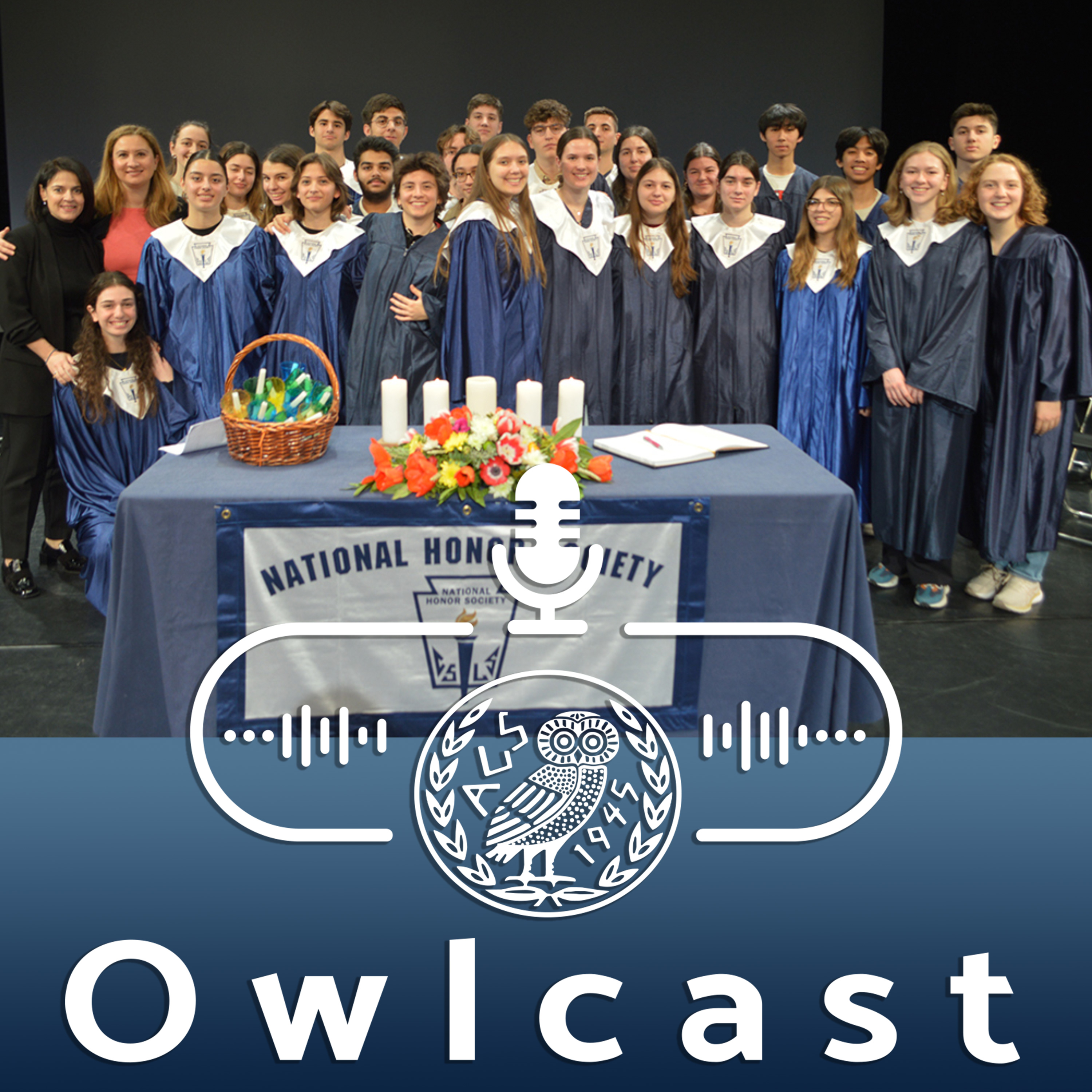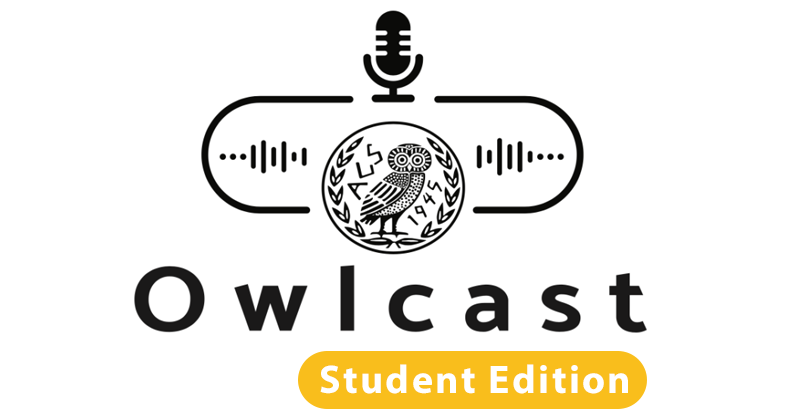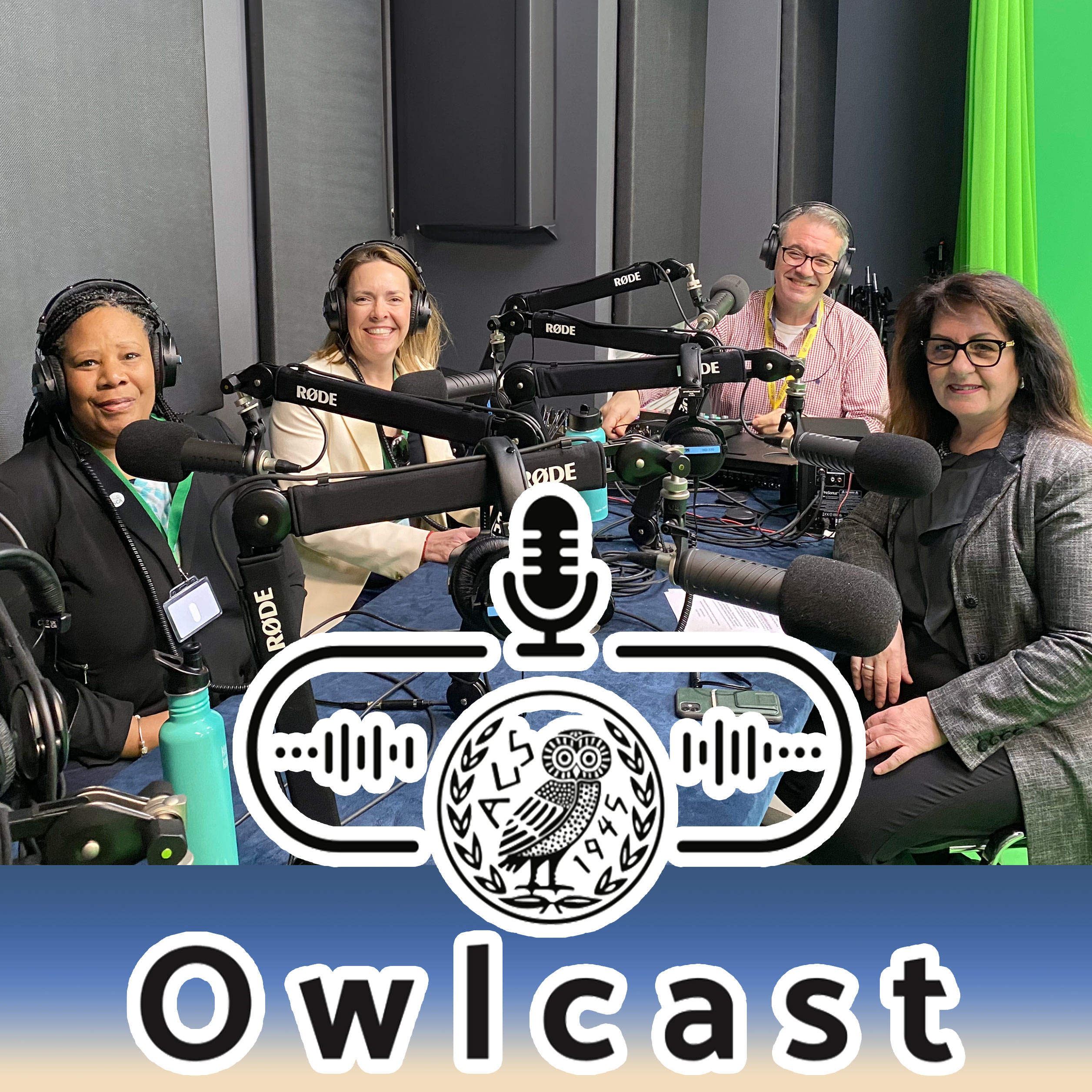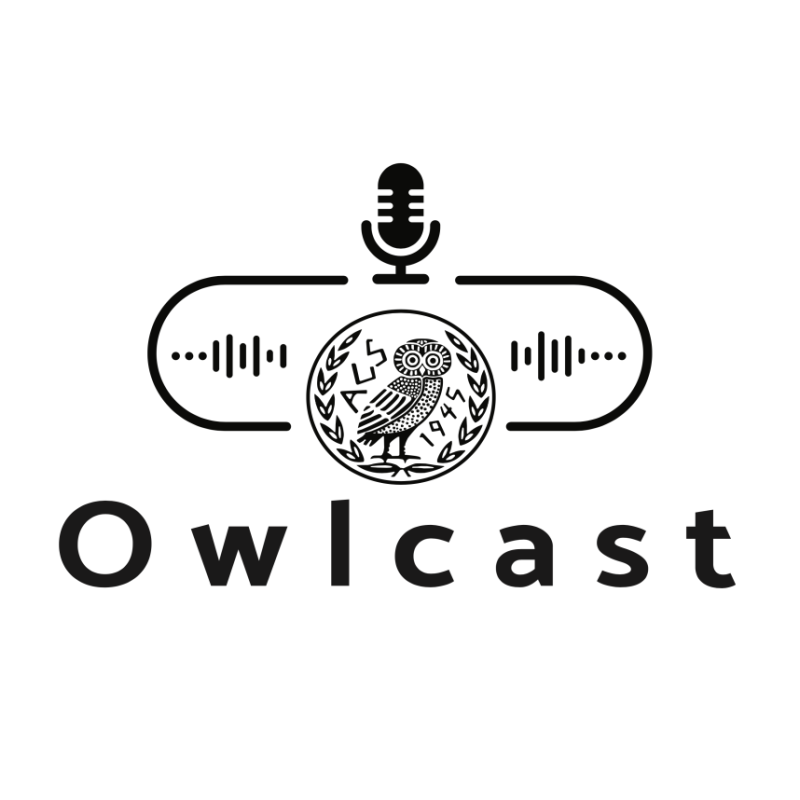Episode Transcript
[00:00:10] Speaker A: This is the owlcast, the official podcast of ACS Athens.
Listen to the exciting story of the american community schools of Athens.
Check out what drives all the members of our international community of learners as we create the education of the future.
Here's John Papadakis.
[00:00:52] Speaker B: Welcome to the Owlcast.
[00:00:54] Speaker C: Today's episode is about belonging to the.
[00:00:57] Speaker B: NHS, the National Honor Society and the merits of being inducted into this prestigious organization. We are joined by two faculty members of the academy who have dedicated their energy and time to guiding students in joining and be active in NHS, as well as a remarkable high school senior who not only exemplifies the pillars of quality of an NHS member, but also serves on the NHS council. Together, we will explore the significance of NHS induction, its impact on students'lives, and the invaluable experiences gained through active participation in this esteemed organization. As faculty advisors to the NHS, our guests bring a wealth of knowledge and insight into the selection process, criteria for induction and the overarching goals of the society. Through their guidance and mentorship, they have witnessed firsthand a transformational journey of students who are inducted into the NHS, witnessing not only academic growth, but also personal development and leadership skills honed through service and community engagement. Our high school senior guest, with her two year tenure on the NHS council, offers a unique perspective on the opportunities and responsibilities that come with being part of this organization. Throughout this episode, we will explore the multifaceted benefits of NHS membership, from the academic recognition it bestows to the opportunities for service and leadership. We will also talk about the ways in which NHS induction shapes students'character, fostering a commitment to excellence, integrity and community involvement that extends far beyond their high school years, into college and beyond. Let's listen to how the achievements of NHS members uncover the profound impact of this honor society on the lives of students and their community. With us today, Dr. Elina Prodromidi and Ms Matina Cacianis.
[00:02:55] Speaker D: I am Dr. Elina Prodromidi. I teach the IB biology and IB environmental sciences in the academy and I'm also the division chair of Sciences and I have been the National Honor Society advisor for the last seven to eight years.
[00:03:10] Speaker E: Hello. My name is Ms. Katiani and I've been teaching mathematics at ACS Athens. I have also been the advisor of the NHS for the last three years and I really much enjoy being a part of this community of excellence, I.
[00:03:27] Speaker C: Would say so this is a good introduction to the whole discussion. Today we're trying to dissect the importance of the national honor society and how it applies in our school because this is not just for ACS, this is for all american schools. Correct?
[00:03:45] Speaker D: Exactly.
The National Honor Society and actually the athenian chapter of the National Honor Society that we have in our school has been a landmark of our school since the beginning.
It is a group of students with high standards, not only in academic excellence, but students who get accepted in this group. They have to demonstrate another three pillars that the NHS represents apart from academic excellence. And this is character, leadership and community service.
[00:04:22] Speaker C: So how are these traits play in your decision, the process of selecting? Because today we have also a student with us who has been inducted in the NHS last year. This is her second year. So what is the process in a sense, how these traits, important traits play in the decision to induct, to propose an induction?
[00:04:48] Speaker E: Okay. Everything begins in a student's year eleven. So we first begin by checking the academic excellence up to the 10th grade.
We're getting the GPAs list from the office and we're checking whether a student has academic excellence overall, holistically in all his classes. And we then start a different process of asking the students who have a suitable GPA, academic profile, yes. To apply and list all the other different characteristics that they have. Like we see from their applications, the character, the service and the leadership skills.
[00:05:33] Speaker D: According to their CV, students are invited to apply. It's not a mandatory application.
We actually call it an activity form that they have to complete and showcase their accomplishments, fostering all these four pillars that the NHS represents. And they can declare their interest in the group either in 11th grade or in twelveth grade. When they get accepted, they stay in NHS provided they maintain those high standards until they graduate and they are recognized in their graduation ceremony.
[00:06:08] Speaker C: And it is important to understand that, as you said, this is at the end the decision of the student. So you make the proposal, let's say the suggestion that these particular students are to be inducted. Yes.
[00:06:20] Speaker E: Given that the students have a clear record of any type of offense in the previous years. So a student needs to be exemplary.
[00:06:29] Speaker C: Clear bill of citizenship.
[00:06:31] Speaker E: Yes, exactly.
[00:06:34] Speaker C: Okay, so let's introduce our guest student today who is here to talk about her experience.
[00:06:41] Speaker D: So the student with us is Danielle Rohan. Danielle has been a member of the NHS since her 11th grade. She was inducted along with her fellow classmates and she was also voted the vice president of the NHS council by the NHS students.
[00:07:03] Speaker C: So Danielle, welcome again. From what your teachers just said, this is something that you chose to come in. What was your reaction when you received that invitation?
[00:07:16] Speaker F: So I always knew that I wanted to be a part of the NHS, because I used to go even before ACS Athens, I was in another american school which also had a national honor Society council. And so when I got the invitation, I directly started with my application.
[00:07:32] Speaker C: So you knew about NHS?
[00:07:34] Speaker F: Yeah. Coming from an american school background, it is like an honor to be inside the NHS, and I wanted that opportunity. So I started directly with my application process and it was pretty simple, but it was hard to showcase. What was the important stuff to include in the application?
[00:07:50] Speaker C: What was the difficulty?
[00:07:52] Speaker F: Well, having done a lot of things, you have to choose what showcases the four pillars. Leadership, scholar, community and character. And putting that in an application of writing and things that you have done is not the easiest to showcase for some people.
[00:08:08] Speaker C: From the four pillars, could you put some kind of ranking in your preference or not? Preference, your aptitude of the three four.
[00:08:17] Speaker F: Pillars that I represent? Yeah, I think I would put character first and then leadership. Scholarship, no, leadership then service and scholarly aptitude is. No, I do think that it's important.
[00:08:33] Speaker C: This is a trick question. I don't know if you noticed.
[00:08:36] Speaker F: I think that's already a given.
You need to have good academic excellence. I think that's the boundary to get you into the NHS. But the other three pillars are what puts you above and beyond everybody else in the school.
[00:08:47] Speaker C: Is there something from these four pillars that you think identifies with a school a little bit higher than the other ones in your mind?
[00:08:57] Speaker F: Maybe character and service? I think as a school we value service a lot. We do a lot of community service and we help others, and there are a lot of activities we contribute to, to maintain that status of. We help ourselves and help others at the same time, and character as well. We're a very diverse community and very vibrant, especially in the National Honor Society, we have a bunch of different personalities that come together.
[00:09:25] Speaker C: You said you came from another american school and the NHS was a familiar idea, familiar notion. Have you thought of maybe something else that could have been included in these four pillars? Do you think that something is missing?
[00:09:42] Speaker F: I don't know if anything's missing. I think it's a well rounded, holistic view of what it means to be a person. Character showcases your personality while you still have the academic status and the empathy towards others with the service. And of course, scholarship and character and leadership is something that you have to have to be a well rounded student and showcase those skills.
But yeah, I do think that character and leadership comes above and beyond everything else to showcase as a national honor society, because that's what makes you stand out from others.
[00:10:19] Speaker C: If it was not an american school and we were somewhere else. Do you think that these values still ring true?
[00:10:26] Speaker F: Yes, of course. It's very important to have that in a character in somebody's life. And I think it goes even beyond an NHS student. That's just what the pillars are for the NHS student. But those are life skills that you take with you.
[00:10:40] Speaker C: Okay, I'll get back to you. But the question stands for the two teachers.
[00:10:45] Speaker D: Can I just add that a lot of our senior students who are members of the NHS do mention their acceptance to the group in their college applications.
Also teachers who write recommendation letters for the students to go to the university. We do mention in our letters that being a member of the NHS is an honor and that this student has demonstrated all these pillars that the NHS is about.
Therefore, it is a special student group guided by students who really excels in all these features. And the community service that Danielle was talking about before has been evident throughout the years of the NHS. NHS students not only help in. In school events, but they also are in charge of major fundraising activities. And my colleague here, Ms Katiani, can mention a few examples.
[00:11:46] Speaker E: Yeah. Like last year we donated to Hatsikiriyakyo foundation, which is an orphanage here in Greece with only girls. We donated presents during Christmas time, so each girl received her own present. We had some fundraising throughout the year. We also organized, together with the NHS and the IB student council, the movie night that we do right before the Christmas break. And that's becoming a tradition among the seniors. We continued with this tradition this year as well. And again, we donated the money.
[00:12:23] Speaker D: And I also add in the past, we've done the famous duck race and stress ball race two years consecutively.
[00:12:32] Speaker C: What were these?
[00:12:33] Speaker D: They were done in the school.
[00:12:35] Speaker C: Can you describe.
[00:12:37] Speaker D: That was an idea. Not my idea, really. I have to give credit to Dr. Crane. Dr. Crane served as the NHS advisor for one year and suggested that when I took over the advisors position, which was a huge success, I have to admit. So we would have these plastic dax that we put in our know when we have a bath time and people would bet on which duck will be 1st, second and third.
[00:13:05] Speaker C: So they were numbered?
[00:13:06] Speaker D: They were numbered. There were many. We did it. I remember there were ducks flying out of my classroom's windows from the first floor of the academy down the yard.
[00:13:19] Speaker C: How many of them?
[00:13:20] Speaker D: Many. I can't remember the number. I mean, it was huge success. This was ran throughout the school.
[00:13:26] Speaker C: So it was this sheet of paper.
[00:13:29] Speaker D: Like a slide, right? It was like a slide from the.
[00:13:31] Speaker C: Top of the building.
[00:13:32] Speaker D: It was from the first floor of the academy down to the yard. People participated from elementary students to high school students, from teachers, faculty, staff. It raised a lot of money. A lot of this money was given to the youth, to youth program, I remember, and to other charities.
Then COVID hit and those really big events were kind of abandoned. Maybe it's something we can think with Ms Catillani reviving, or you can find something else, or we can find something else. But it was a huge success, I have to admit.
The NHS is trying to do something which will involve more.
[00:14:10] Speaker F: The community.
[00:14:10] Speaker D: The whole community. That's the whole idea. I think it has been successful so far in helping, as I said, not only our school, but other communities outside the school. And what I have to praise about our students is that they do undertake the role of being an NHS member with great respect.
And they are really dedicated to volunteering and providing service, even though they may have IB exams, even though they may have deadlines to meet, because it also involves the 11th and the twelveth grade IB students, which means sometimes when we do an event, they could have upcoming deadlines. This is something I'm very proud of and we are both very proud of seeing the dedication and the offering from these individuals.
[00:15:05] Speaker C: So going back to Danielle, can you think of an activity that really either affected you or made you think that? That's why I'm in the NHS.
[00:15:18] Speaker F: One of my favorite volunteerings that I've done for the NHS was last year, the ECIS conference that we had to volunteer at and why that stood out for me. Basically what it was, it was an event where a bunch of teachers internationally came to our school for a summit where they would do workshops together and discuss certain events, such as inclusivity in a school.
[00:15:44] Speaker C: Was it because of the topic or was it because it was an event and you could see a lot of people?
[00:15:50] Speaker F: It was a little bit of both. First of all, I learned a lot about how to handle some people skills because I was in charge of maintaining certain new teachers and international teachers towards their designated areas. And I also had to hang back and watch the summits as well, which was very interesting. And that led me to think a lot about how to handle people skills in life and certain situations.
[00:16:18] Speaker C: You said you were leading, so you had a number of students that were also volunteers. Right. What was challenging about you leading this group of people?
[00:16:29] Speaker F: The most challenging thing was everybody was so much older than me, so I felt a little bit out of place telling adults where to go and the time schedule as somebody who was younger, as an NHS student, but it also taught me how to work with others, to set a crowd to a certain designated area, and that goes on for other skills in life.
[00:16:53] Speaker C: Did you feel more comfortable about yourself at the end?
[00:16:56] Speaker F: Yeah, definitely, once we worked out, and it wasn't just me working with other NHS counselors as well.
[00:17:02] Speaker C: So after your experience with NHS right now, I mean, you're going to college next year. How do you think your participation in NHS is going to benefit you when you go to college? I mean, I'm pretty sure from our discussion we've had, NHS is active to many colleges. How is this going to affect your.
[00:17:23] Speaker F: College life in so many ways? I mean, I learned so many leadership skills through the NHS that going into university is very important to keep with me, especially in university, it's a much more international setting. So to stand out, you need to go above and beyond. And doing things with the NHS has taught me how to stand out in a community like that, and also joining clubs and maintaining that service and character that I've learned in the NHS and maintain through the NHS, I will bring with me to university and maintain that character and service.
[00:17:58] Speaker E: These students are becoming role models for the community in general. So when they move on to college, they're still role models and they carry all these attributes and those characteristics that they gained in their high school years. And since we are an educational institution, our main goal is to send out global citizens with all these four attributes. Mainly we're making them good thinkers, good characters, empathetic citizens and leaders. Yes, for me, it's the last attribute, actually, the leadership, because sometimes you need to be humble as well, and this is part of the character, but also being leaders and being decision makers and what they're doing and not being carried away with everything that life brings in the future is very important for me. What they're doing now in their high school years is very important because this is a very powerful experience for a 16 years old, for a 17 years old that can carry with him or her in the future, not only in the university years, but later in life.
[00:19:05] Speaker C: That's why I asked her, because for someone to get a piece of paper or be a part of a ceremony is some stamp of approval. But at the end, what's he mentioned before? People skills, leadership skills, actual life skills. This is what I think stays with you.
[00:19:24] Speaker D: Yes, I agree. I think the NHS is a small preparation for the outside world demand of skills. And as Martina said, to really rehearse those skills, enhance those skills and being able to maintain those skills is the challenge out there. So going to the university, our NHS students have already received a good flavor and have practiced, enhanced those skills, which we hope they will keep with them and develop them even more as professionals or as adults. We need ethical leaders out there. We need conscious citizens out there. And being a part of a group of students who really shows evidence of these skills is very important for them.
[00:20:21] Speaker C: My last question is for Danielle.
Obviously, you're in your senior year. You know students that are in your own age group, but you also know younger students. What would you say to a younger student who might have the academic standard, but they're missing something? They're missing something from the four pillars. What would you tell them to motivate them to reach the level where they might be eligible for the NHS?
[00:20:52] Speaker F: I would tell them to do everything that they can to go out of your comfort zone, volunteer in different areas, try even if you haven't done something before, try a new skill. Go and volunteer even when you haven't been with those group of peoples, because that's what brings you out and showcases you as a person that's outgoing and strong in character and does service. And all of that academic is a boundary. But to set you out of the standards around a bunch of really academically strong people, it's the other three pillars that make you stand out. And to do that, you just have to try new things and do as much as you can to set you out for that.
[00:21:37] Speaker C: Thank you, Danielle. Thank you, Ms. Caciani. Thank you, Dr. Brothermidis. We should have had more students to talk about these things, but I know how difficult it is, especially at that age, to bring them at the same time. And maybe an asynchronous session would be the solution next year.
[00:21:55] Speaker D: Thank you so much for having us. Thank you.
[00:22:01] Speaker A: You are listening to the owlcast, the official podcast of AC Athens. Make sure you subscribe to the Allcast on Google Podcasts, Spotify and Apple Podcasts. This has been a production of the ACS Athens Media studio.



